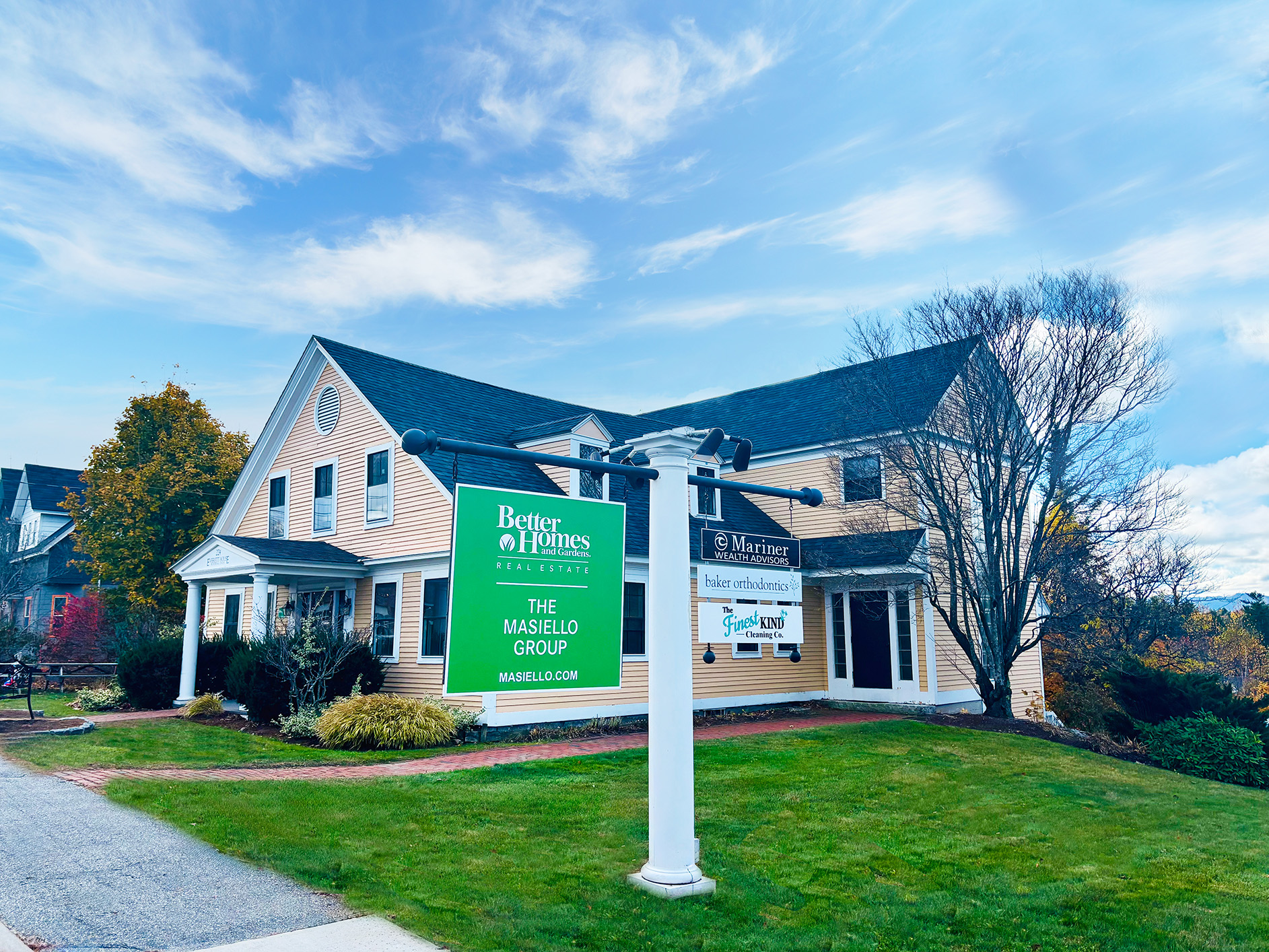
Photo Credit: Emma Bauso
Do More Families Equal Higher Taxes?
By: Donna Forest, Broker Associate
The lack of overall housing in our state is keeping prices higher and buyers on the sidelines, or even worse, leaving our state. We are seeing a significant housing crisis. Unfortunately, new construction is still playing catch up from the years of under building and many towns are reluctant to help address this major economic issue. Why? One of the reasons is a fear that housing for additional families will mean a higher property tax rate is needed to pay for public schools. Is this true? The answer is emphatically “NO”. Adding children to a school district does not equate to higher property taxes. This was proven in a 2019 study by Univ. of NH Professor Emeritus of Economics Robert England “Will More Kids in Town Raise the Local Tax Rate?” This report analyzed enrollment data from all 167 school districts from 2007 to 2017 and then compared the data to property tax figures during the same period. The results showed that changes in tax rates are not related to changes in public school enrollment and shouldn’t be used as a way to oppose new housing. Please bear this in mind as you consider how to keep your community viable and economically sound.
Follow Donna on Facebook!
#bhgmilestoneteam #bhgmilestone #bestteamintown #bhg #realtor #donnaforest

Welcome Your Guests with Pink Pineapples
When you’ve traveled down Main Street in New London, you’ve noticed our seasonal BHG Milestone Team daily flags! It’s a BHG Milestone Team favorite – and we have some special Pineapple Welcome flags. Did you know the pineapple is the worldwide symbol of hospitality? In Colonial times, the pineapple was treasured and rare – and extremely difficult to cultivate. So, the pineapple became a fruit for the wealthy only. In fact, a George Washington-era pineapple would cost up to $8,000!!! (That’s $280,000 in today’s money!) The scarcity and price made pineapples the perfect choice to serve honored guests – and became a symbol of welcome and reference for visitors. Today, we can celebrate with pineapples of all colors – like the Pinkglow® Pineapple! When you see our pineapple flag, come on in for a visit as an honored BHG Milestone Team guest!
#bhgmilestoneteam #bhgmilestone #bestteamintown #bhg #realtor
Photo courtesy of DelMonte.

Real Estate Terms: What is the MLS?
The MLS, or Multiple Listing Service, is the database managed and maintained by the local board of REALTORS ®. When your agent lists your property, she inputs all the information into that database. The New Hampshire Association of Realtors ® syndicates that database to only certain providers – like Realtor.com. This is why when you search for property on Zillow and call your agent about it, she may tell you that property is no longer available. Even Realtor.com experiences a delay from the official MLS to what it shows as available or not. For example, if the listing agent marks the property in the MLS as under contract, it could take hours or longer for the syndicated sites to catch up with that update. When you want current listings, contact your agent, or visit her website for active listings. Your agent has direct access to the MLS and her website uses a database feed (called IDX) – she has the updates in real time. Or, if you can’t wait, use Realtor.com as your go-to public database.
And come back to The BHG Milestone Team blog to learn more helpful terms to enhance your real estate adventure!
#bhgmilestoneteam #bhgmilestone #bestteamintown #bhg #realtor
Photo by Towfiqu barbhuiya on Unsplash

THE FORGOTTEN SPOTS OF SPRING CLEANING
Whether you are preparing to stage your home for sale or undertaking your spring-cleaning ritual, Better Homes & Gardens, and House Logic , remind us of overlooked areas. These less obvious tasks should become part of your routine:
- Clean and inspect your vacuum.
- Wipe down handrails, doorknobs, light switch plates, railings. Considering these items are petri dishes, you should probably add them to your weekly cleaning list.
- Clean the undersides of surfaces. When is the last time you wiped the bottom of your kitchen table?
- Your toothbrush holder…and toothbrush!
- Dispose of those toxic chemicals… like old paint! Check your town’s toxic waste disposal day to responsibly rid yourself of those cans piling up in the garage.
- Oh…the ice cube trays! (I forgot, too.)
- Wipe down computer peripherals – and your office items (pen holder, mouse pad, telephone cradle…).
- Clean out that pantry! Oils – and foods that contain oils, like nuts, can go rancid.
- Dust those plants! Whether live or plastic, plants leaves collect lots of dust.
#bhgmilestoneteam #bhgmilestone #bestteamintown #bhg #realtor
Image free clipart

COMMUNITY EVENTS: Native American Stories of the Night Sky
Christy A. Schmidt, Information Manager
On Friday, April 21, my husband and I, and another 150 people, attended the Mount Kearsarge Indian Museum Native American Stories of the Night Sky. While sipping hot cocoa and hot cider, and enjoying s’mores, attendees gathered around the campfire to listen to tales of the stars.
My favorite was the Winnipesaukee story of trip through the stars to the afterlife. I’m paraphrasing:
All the dogs you have ever known guard a log over a deep chasm. You must cross that chasm to reach the afterlife. If you were good to the dogs – took care of them, loved them, respected them – they will hold that log steady and help you pass. But if you were cruel to them… you’re not getting across!
After the many stories, including an Irish folk tale and some attendees were invited to share, we were able to view Venus and the Moon through telescopes provided by the McAuliffe-Shepard Discovery Center. The weather was cool but clear – and we had an incredible view of the heavens. Discovery Center volunteers were there to educate and inform.
What a wonderful evening! Humans have always enjoyed an oral tradition, sharing stories, history, songs and poetry. The evening was a reminder that no matter our heritage, we share our knowledge and experience through stories.
Check out the BHG Milestone Team Community Calendar for other amazing events – events featuring everything from arts to music to history enliven our life in New Hampshire! Get out there and have some fun!
#bhgmilestone #bestteamintown #mtkearsargeim #msdiscoverycenter #bhg #realtor
Photo courtesy of Mt. Kearsarge Indian Museum
Is Owning a Home a Good Investment?
The short answer is YES. According to House Logic and The BHG Milestone experts, owning a home has financial – and emotional – benefits! Consider:
- Long-term financial growth. Real estate appreciates!
- Building equity. From your downpayment to your mortgage payments (minus fees and interest), each dime adds to your home’s equity.
- Income tax advantages. The sale of your primary residence allows you (in most cases) to avoid tax on your profit ($250,000 for an individual; $500,000 for a couple).
- Additional itemized deductions. If you itemize your taxes, you can deduct property tax, some closing fees (like points), and mortgage interest!
- Fixed monthly payments. Your rent might (will) increase – but your mortgage payment is fixed.
- Improved credit score. Pay on time and reap the benefit!
- Your space – your castle. When you own your home, you can remodel and decorate any way you desire!
- Your sanctuary. Your home is your private sanctuary. It’s all yours!
#bhgmilestoneteam #bhgmilestone #bestteamintown #bhg #realtor
#buyahome #homefinancialbenefits

It’s Still a Seller’s Market
By: Donna Forest, Broker Associate
If you are in the market looking to buy this year, you’ve probably noticed the lack of homes for sale. Case in point, there are only 9 houses for sale in the combined towns of New London, Newbury and Sunapee – and 3 are to be built (as of 4/19). New listings in the state of NH are down almost 20% compared to the first 3 months in 2022. When the supply of homes for sale are so low it creates increased competition among purchasers and keeps upward pressure on prices. And houses tend to go under contract very quickly once they hit the market. Not unsurprisingly, sales thru March in NH are down 19.7% yet the median sales price is up 3.6% to $430,000. Sales in the 3 combined towns are down 26% compared to 2022 and the median sales price is up 8.5% to $558,250.* So, should you wait to buy until prices come down? Data shows prices are increasing in much of the country and experts project home prices will rise steadily and return to more normal levels of appreciation after this year. Whether buying or selling, contact me for the latest insights into our local market.
* Figures are based on information from the Northern New England Real Estate Network, Inc. for the period 1/1/ - 3/31/22 and 1/1/-3/31/23
#bhgmilestoneteam #bhgmilestone #bestteamintown #bhg #realtor #donnaforest

Fair use
LOCAL ARTIST DAY: Poet, Jane Kenyon
When the BHG Milestone Team is not helping our community with real estate transactions, we are trading books and sharing stories. This week, Marilyn sent me information about a local poet – and I am thrilled to share her with you!
Meet New Hampshire’s past poet laureate (January 1995-March 1999), Jane Kenyon. She published four volumes of poetry – From Room to Room (1978), The Boat of Quiet Hours (1986), Let Evening Come (1990), and Constance (1993). She was also a talented translator, publishing Twenty Poems of Anna Akmatova (1985).

Fair use; Photograph by Stephen Blos.
Although Kenyon was born in Michigan, she called New Hampshire home in 1975 when she and her husband, poet Donald Hall, moved to his ancestral home in Wilmot. The property has been rescued and is being lovingly restored and managed by At Eagle Pond, Inc..
The film, A Life Together, celebrates the creative couple.
To truly know Jane Kenyon, one must experience her simple but emotionally resonant poetry. In the film, In Her Shoes, the character, Maggie, played by Cameron Diaz, is learning to read. To practice, she reads several poems – including Kenyon’s “Let Evening Come.”
#bhgmilestoneteam #bhgmilestone #bestteamintown #bhg #realtor #janekenyon #poetlaureate #nhpoets

TEAMWORK
Every region has its share of real estate agencies, and our locality is no different. According to Realtor.com, New London boasts 136 licensed agents! If you’re a buyer or seller, how do you choose from among those talented people? The BHG Milestone Team advises you choose a team over an individual. The strength of our office is our unique approach: No matter which agent has the listing or the buyer, the whole team – every agent and administrator – is involved and serving that customer or client. Agents share experiences and expertise, work together for open houses and marketing initiatives, so no matter if you are selling your home or shopping for a new one, you have a team beside you! Expect BETTER from the Best TEAM in town!
#bhgmilestoneteam #bhgmilestone #bestteamintown #bhg #realtor #teamwork

HAPPY WORLD LAUGHTER DAY
Just How Many Realtors Does It Take…to change a lightbulb?
Just one Realtor is all it takes to screw a handsome, bespoke lightbulb into the crystal and antique brushed brass chandelier in the grand entryway with soaring ceilings and custom crown molding in this classic Georgian-style home located in a gated neighborhood with private lake and golf course – and panoramic views of Mount Kearsarge. Won’t last! Must see!
#bhgmilestoneteam #bhgmilestone #bestteamintown #bhg #realtor




